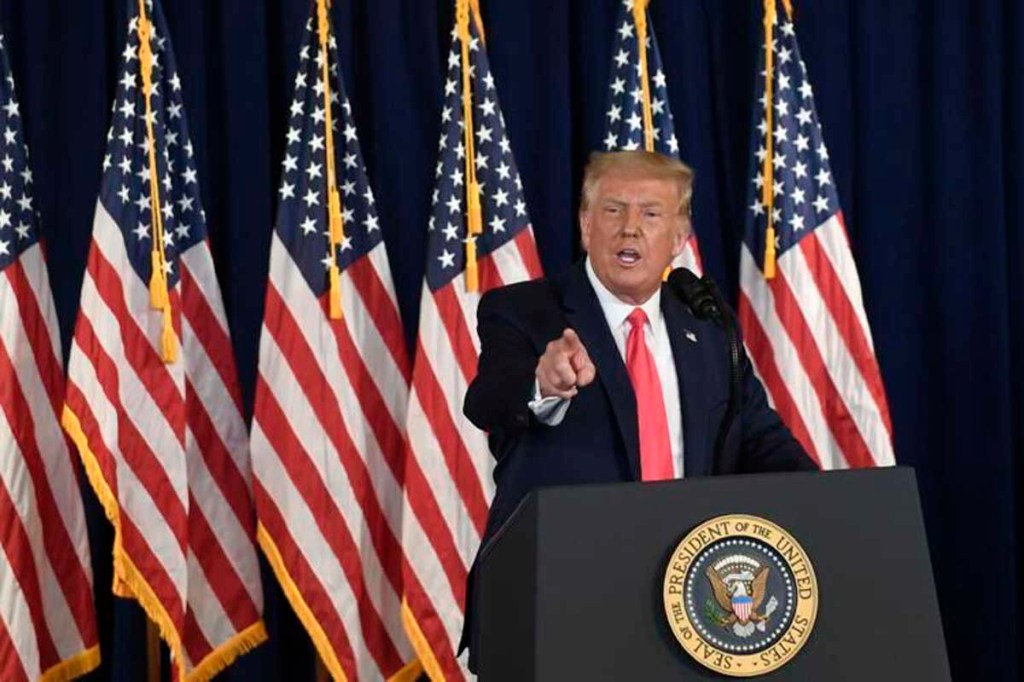Trump defends 2020 call to Georgia’s top election official
Published 8:11 am Saturday, April 8, 2023

- President Trump on Saturday, Aug. 8, 2020, news conference in the ballroom of the private Trump National Golf Club in Bedminster, N.J.
ATLANTA — Former Pres. Donald Trump is standing firm on his position that he did not attempt to interfere with Georgia’s 2020 presidential election.
In a Jan. 2, 2021, recorded phone call, Trump pressed Ga. Secretary of State Brad Raffensperger to “find” 11,870 votes, which would have placed him as the victor over then-Democratic challenger Joe Biden in Georgia.
During a speech April 4 at his Mar-a-Lago estate, Trump said it was an “absolutely perfect” phone call. He said lawyers were also on the call.
“Nobody said, ‘Sir, you shouldn’t say that,’ — there were many people on the phone — or hung up in disgust because of something I inappropriately said,” Trump said. “Because nothing was said wrong. In fact, at the end of the call, we agreed to continue our conversation about election fraud, specifically in Georgia.”
According to information revealed last year by the House Select Committee investigating the Jan. 6 Capitol attack, Trump’s chief of staff Mark Meadows called Raffensperger’s office at least 18 times to set up a call.
“What I knew is that we didn’t have any votes to find. We continued to look. We investigated. I could share the numbers with you. There were no votes to find,” Raffensperger said at the Committee’s hearing. “That was an accurate count that had been certified.”
Fulton County District Fani Willis sanctioned a special grand jury last year to investigate claims of election interference in Georgia.
The 26-member grand jury’s report, released in part in February, stated that the group believes that perjury may have been committed by one or more witnesses before it, and recommended that Willis “seek appropriate indictments for such where evidence is compelling.”
“This fake case was brought on to interfere with the 2024 election and it should be dropped immediately,” Trump claimed at his April 4 event.
According to The Associated Press, Willis, as part of her investigation, is looking into Trump’s phone calls with Georgia officials; more than a dozen Georgia Republicans who signed a certificate falsely declaring Trump as the winner; and the alleged copying of data and software from election equipment in Coffee County by a computer forensics team hired by Trump allies.
Trump’s attorney filed a motion March 20 to quash the final report of the Fulton County special grand jury, and to disqualify the Fulton County District Attorney’s office from any further investigations or potential prosecution for alleged interference.
Willis’s office, ordered by a judge to respond to Trump’s motion by May 1, declined to comment on the case.
Trump continued ranting against the Georgia probe in his speech by calling Willis, who is Black, a racist.
However, in an April 5 interview with WSB-TV in Atlanta, Willis seemed unbothered.
“I support his right to be protected by the First Amendment and say what he likes,” she told WSB-TV. “People have the right to say whatever they choose to say as long as it does not rise to the level of threats against myself, my staff or my family.”
Trump has also called Manhattan DA Alvin Bragg — who issued a 34-count indictment to Trump hours before his Mar-a-Lago speech — a racist. The indictment alleges Trump falsified business records, in part, for payments to women he allegedly had affairs with to remain silent.
New York Attorney General Letitia James is also among other head attorneys who have brought cases against Trump. James currently has a civil lawsuit against Trump for alleged financial fraud in securing bank loans and other fraudulent crimes. Bragg and James are also Black.
Jack White, U.S. special counsel, is overseeing investigations into Trump’s involvement with the Jan. 6, 2021, insurrection and Trump’s alleged obstruction of justice involving classified documents at his property.





